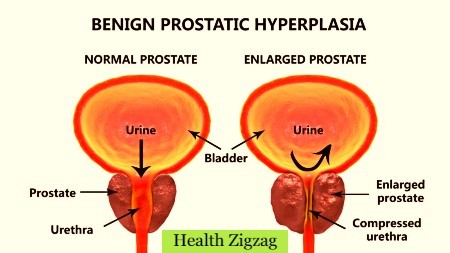
Benign Prostate Hyperplasia or BPN is a type of enlargement in the prostate gland which is usually non-cancerous [1]. This prostate enlargement occurs in males and causes a high discomfort in urination, excretion and sometimes digestion as well. The actual cause of this disease is not known but can be diagnosed with medications and some changes in the lifestyle.
Signs and symptoms of BPH and Benign Enlargement of Prostate gland
The basic signs of having BPN is facing problems in passing urine through the urethra. Sometimes, the patient might find it difficult to control the urge to urinate even after short intervals. They might suffer from involuntary urination and need to urinate now and then. They might also feel discomfort or pain in their lower abdomen region and hurt while urinating.
- One of the major symptoms of a person suffering from BPN is their involuntary urination at night or their inability to feel their urge to urinate. They might have to urinate at night and could bed wet frequently even as an adult. The urine could leak without the patient knowing about it.
- Hesitancy in urination could also be a symptom of a person going through BPH and Benign Enlargement of the prostate In this, the person would want to urinate and would get a sudden urge. However, when trying to urinate, you might notice a delay between the urge and the actual urination to start. The person might also notice a weak stream and an inability to empty the bladder properly.
- The patient could be suffering from a full bladder almost all the time but not to urinate it when trying. This might also lead to discomfort in the urethra and lower abdominal region. The person may start to feel pain in the region as well.
What are the expected causes of the BPH?
- Many studies suggest that males suffering from BPH and Benign Enlargement of the prostate gland could have certain genetics that has led to this abnormal growth in their bodies. The prostate gland produces testosterone which is responsible for all the changes occurring in the reproductive system of the males.
When this hormone released abnormally, this leads to certain chemical reactions. Which leads to an enlargement of the prostate gland. This abnormal release is usually a result of genes and could be going on from generations. This fact is supported by a study that dealt with males that were castrated. These men did not suffer from BPH and proved that this disease is directly or indirectly related to the concept of genetics.
- Doctors suggest that one of the reasons behind this abnormal growth could be the diet that the person usually follows. The males that live in rural areas are less likely to suffer from BPH and Benign enlargement of the prostate gland due to the low intake of animal proteins. More so, people from cities that consume more animal proteins and alcohol suffer from the disease. As excess of proteins in the body could lead to the enlargement of organs. Many studies have begun in this area as well.
Diagnosis:
You can treat this disease by bringing in some lifestyle changes like eating healthy and consuming very low amounts of alcohol. Various medications can also prove to be a big help in this case. And as the disease is getting popular, better treatment methods are coming up.
Although a non-cancerous disease, this enlargement of the prostate gland can lead to a very dangerous disease if not taken care of at the right time. Make sure to get the right treatment as soon as possible before it’s too late.
Read Also: Does carrageenan disrupt the health of your intestines?




